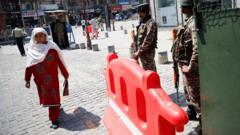The US has intervened in escalating tensions between India and Pakistan following a deadly militant attack in Kashmir, urging dialogue and investigation. Both nations have retaliated with a series of military and diplomatic measures, heightening fears of armed conflict.
US Calls for Peace as Tensions Escalate Between India and Pakistan Over Kashmir Attack

US Calls for Peace as Tensions Escalate Between India and Pakistan Over Kashmir Attack
After a fatal attack in Kashmir claimed several lives, the US urges both nations to de-escalate rising tensions amid military threats and mutual accusations.
The recent deadly militant attack in Indian-administered Kashmir, which resulted in the death of 26 civilians, has prompted urgent calls for de-escalation from the United States. Secretary of State Marco Rubio convened discussions with both Indian Foreign Minister S Jaishankar and Pakistani Prime Minister Shehbaz Sharif, urging them to prioritize peace and stability in the region.
India has attributed the attack, which took place near Pahalgam, to militants allegedly backed by Pakistan, a claim that Islamabad vehemently denies. In response to the incident, India closed its airspace to all Pakistani aircraft and suspended visas for Pakistani nationals, among other retaliatory moves.
The tension has intensified further as reports emerged of Pakistan possibly being poised for military action against India, raising alarms within diplomatic circles. Rubio expressed the need for unity against terrorism during his conversations, while also condemning the attack to Prime Minister Sharif.
Aside from the political maneuvers, there have been significant military changes on both sides, with Indian Prime Minister Narendra Modi empowering the armed forces to make critical decisions on how to respond to the assault. Indian cabinet meetings have been frequent, suggesting a heightened state of alert.
Casual exchanges of fire across the border have exacerbated the situation, coinciding with a broader media blackout, including the banning of several Pakistani news channels and the limiting of access to the accounts of Pakistani celebrities on social platforms within India.
Although India has not officially named a group responsible for the attack, reports suggest that the Resistance Front, which has affiliations with the Pakistan-based militant group Lashkar-e-Taiba, may be involved. Survivors have indicated that the attackers specifically targeted Hindu individuals, amplifying communal tensions.
As both countries navigate this crisis, Modi has vowed to respond with measures that would ensure accountability for the perpetrators, further complicating the dynamics of an already volatile situation. The region remains a longstanding flashpoint between the two nuclear-armed neighbors since their partition in 1947 amidst conflicting claims over territory in Kashmir.


















